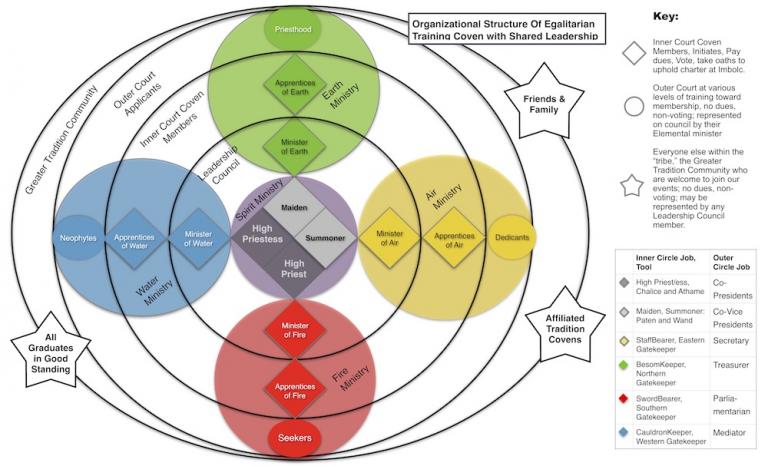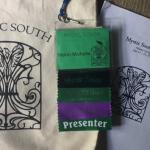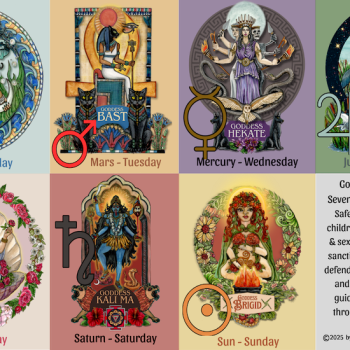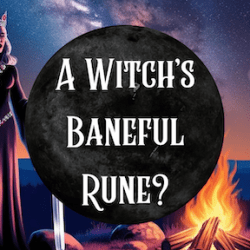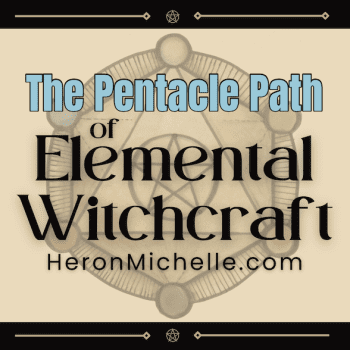Template Charter for an Egalitarian Witchcraft Training Coven
Contents:
- Statement of Intent
- Article I: Coven Name
- Article II: Mission Statement
- Article III: Purpose
- Article IV: Structure
- Article V: Leadership Council’s Roles and Responsibilities
- Article VI: Electoral Process
- Article VII: Sabbats, Esbats and Gatherings
- Article VIII: Coven Rights and Responsibilities:
- Article IX: Business Meetings
- Article X: Hiving A New Coven within the Tradition
In order to foster mutual understanding and promote the smooth running of our collective spiritual endeavors, we who are members of [Coven Name] do create this charter. We consent to work and celebrate together according to these rules in which we are in full agreement. We cherish what we are building together, and we thereby swear our sacred oath to uphold this charter.
Article I – Coven Name:
A. From this day forth the name of this ministry will be known as [Tradition Name] to the outer community with the governing body of this ministry known as [Coven Name]. This is until such time that this organization should disband or until the governing bodies of the ministry, with the blessings of its members, changes its name.
B. The meaning of the coven name is…[define the meaning]
Article II – Mission Statement:
Example: The ministry of [Tradition Name] is dedicated to the Great Work of furthering the awakening, evolution, and enlightenment of our society as spiritual and magickal practitioners. [Coven Name] works to facilitate responsible education and training in Modern Witchcraft open to all seekers, which is continually evolving and improving. [Coven Name] serves as a spiritual family, and as an affiliation of independent Witches practicing nature-based spiritual craft. Members of [Coven Name] seek personal growth through Divine Love and a healthy life in harmony with nature, with respect and responsibility, harming none.
Article III – Purpose:
A. To provide a training program for the practice of Modern Witchcraft and Neo-paganism, upholding a mission of service through spiritual leadership and mentorship.
B. To participate in the interfaith community.
C. To help develop the Pagan community at large.
D. The Great Work will include:
- Ritual celebration of the Sabbats open to [Tradition Name] and occasional guests by approval.
- Ritual celebration of Esbats through each moon cycle, open to initiates and neophytes.
- To serve as clergy and conduct rites of passage for our [Tradition] and community.
- To provide a structure for deepening our members’ knowledge and experience as they grow in mastery of their Craft.
Article IV – Structure:
Section 1 – Layers of Involvement
Involvement in [Tradition Name] exists in several layers. Involvement does not mandate that one must proceed through all the levels. The levels and their requirements are as follows:
A. Seeker: Open enrollment into the training program.
- Must attend at least one of the [Outer Court Training] classes.
- Must be eighteen years or older.
- Underage children and wards of [Coven Name] members may attend classes with a member parent.
- Must maintain a respectful, discreet, responsible, and sober personage while in class and sacred space.
B. Dedicant: A Seeker who has:
- Attended at least one six week session of classes.
- Attended an interview with at least 3 members, and been promoted by majority vote.
- Dedicated to [Coven Name] through an intention ritual.
- Set an intention to complete Outer Court Training Program, with the goal to become a witch in title and practice.
- Will Turn one Wheel of the Year of Sabbat celebrations.
C. Graduate: A student who has completed the Dedicant requirements:
- Successful attendance, or independent completion, of [minimum number of classes out of total number of classes.] Graduates may be promoted with their class continent upon the successful completion of up to [?] make-up lessons, to be finished between Yule and Imbolc of the following year.
a. Missed classes made be made-up by completing the reading and assignments of the lesson and reviewing their work privately with one of their session’s instructors. - Attendance of at least 5 out of 8 sabbats.
a. Missed coven sabbats may be independently completed, within 2 weeks of the sabbat date, using the pertinent lessons and solitary rituals provided in any of the official [Outer Court Training Program] textbooks, and reviewing their work privately with one of the instructors for that session. - Completion of graduation assignments, tests, and projects as determined by current instructors of the [Outer Court Training Program]
- A graduate interview scheduled the last week of the [Outer Court Training Program], attended by at least 3 voting members of [Coven Name], promoted by majority vote.
D. Neophyte: A Graduate who chooses to seek initiation into the Craft.
- The Neophyte stage is the symbolic “day” of the year and a day training. It is the final session of the [Outer Court Training] classes.
- Blessing to advance to the Neophyte stage is determined by majority vote of [Coven Name].
- Must be at least eighteen years of age.
- The Neophyte stage is defined by the completion of [specifics of your program.] They must be completed independently with the guidance and sponsorship of a mentor.
- A mentor must be an initiated, voting member of [Coven Name].
- Neophytes may continue to attend Dedicant classes at no additional expense for up to one year.
- May attend [Coven Name] esbat rituals as a guest of their mentor.
E. First Degree Initiate: A Graduate who takes vows of dedication to the practice of Witchcraft.
- Has completed all Neophyte requirements to the satisfaction of the Neophyte and their mentor.
- Has chosen to self-initiate to the path of the Witch (4), by title and practice (5).
- This ritual is designed to the preferences of the initiate, with the aid of their mentor, and facilitated by any members of [Coven Name] that the initiate invites to be present.
- The initiate may choose any synonym for Witch, Wise One, or Magickal Practitioner as a self-title with which they resonate.
- The Witch creates an integrated practice for themselves that is personal, yet falls within the parameters of Modern Witchcraft as it is defined by the [Outer Court Training Program].
- By this definition… [define what this means for your own group] Here is an example: We define Witchcraft as a nature-based praxis that is an art, science, and religion. This practice must prepare the practitioner to serve Spirit and/or their community by integrating any of the following: Serving as clergy, community leader, magickal practitioner, healer, counselor, or walker between the worlds. As long as this practice is of benefit to themselves and society, harming none, all variants of this praxis will be honored.
- After completion of initiation one may choose to continue as a solitary practitioner and remain an outer member of [Tradition Name], or seek membership within [Coven Name].
F. Initiate Member: A First Degree Witch who Chooses to join [Coven Name]
- At this stage the initiate may choose to continue in association with [Coven Name] and take membership, as a separate consideration to their initiation.
- Must be approved by unanimous vote of all members of [Coven Name].
- Takes membership vow to uphold charter at Imbolc Sabbat each year; membership is renewed on a yearly basis.
- May participate in the leadership, guidance and governance of [Coven Name] as a voting member.
- May attend advanced training classes offered by [Coven Name].
- May participate in [Coven Name] Esbat rituals.
- Will apprentice within one of the Elemental Ministries.
- Financially responsible as defined in Article IV – Structure, Section 5: Finances.
- Members may attend all [Outer Court Training Program Classes] as a guest at no additional cost.
- Members may resign at any time with written notice to the Leadership Council.
G. Second Degree Initiate: A Witch who initiates to service as a Priest or Priestess.
- Must be available to members of [Coven Name].
- Continues growth for at least another two years and a day from first degree initiation.
- Completes in-depth study and practice in the topics/roles of most interest to the student, integrating what has been learned into a private practice.
- Gains proficiency towards mastery of at least one of the witches skills or roles of the Craft (i.e., Healing, divination, magick, spirit work, etc.)
- Must plan and lead at least one Esbat for [Coven Name].
- Works as a mentor with a neophyte, as called upon.
- Must teach or help teach at least one class.
- Regular attendance and participation in circle activities in person, or virtually if distance is inhibiting.
- Will participate in the guidance and governance of the circle as a voting member.
- Financially responsible as defined in Article IV – Structure, Section 5: Finances.
I. Third Degree Initiates: Ordained as High Priest or Priestess.
- Candidates will have demonstrated effective leadership and can act independently of [Coven Name] as the leader of a coven affiliated with [Tradition Name].
- Must have exhibited continued growth and service for at least another three years beyond Second Degree Initiation.
- Have completed their first Saturn return; greater than 30 years of age.
- Exceptions may be made by majority vote of the Leadership Council.
- Must successfully serve at least one term in an official leadership position within [Coven Name].
- Must gain mastery in a specific area of service or skills.
- Regularly teaches classes in specific areas of expertise.
- Mentors Neophytes as called.
- Participates in the guidance and governance of [Coven Name] as a voting member.
- Eligible for an official leadership position with [Coven Name].
- Eligible to apply for legal clergy license.
- Financially responsible as defined in Article IV – Structure, Section 5: Finances.
J. Council of Elders:
- Composed of all third degree initiates who have successfully completed a term as the High Priest or High Priestess within any [Tradition Name] affiliated coven, and then retired from that position.
- Council of Elders may be convened by special request of the Leadership Councils of any affiliated [Tradition Name] Coven.
- Council of Elders may be called upon to aid in governance of The [Tradition Name] at large.
- Council of Elders may be called upon to act as a judicial body, as needed.
- Elders may organize special programs for our children and elderly, including rites of passage for new babies, young adults, honoring new parenthood and eldering.
Section 2 – Non-discrimination:
[Coven Name] offers equal opportunity membership to any adult over eighteen years of age regardless of race, color, ethnicity, spiritual path, gender, sexual orientation, or intersexes.
Section 3 – Grievance Resolution System and Grounds for Expulsion:
This section is for the purpose of protecting [Tradition Name] and [Coven Name]’s Great Work.
A. Grounds for Expulsion: [Coven Name] wishes to maintain a safe community atmosphere within [Tradition Name].
- Habitually disrespecting other members based on their religious beliefs, traditions, race, ethnicity, age, and/or lifestyle (Sexual or otherwise) is grounds for expulsion.
- The assault or harassment of any person will not be tolerated in any physical, metaphysical, or electronic environment(s). If convincing proof is provided of a member’s involvement in above-mentioned actions, it will be grounds for expulsion.
- No member can be expulsed from this organization without due process through the Grievance Resolution system (B), and a three-quarter vote from the entire [Coven Name] membership.
B. Grievance Resolution system:
- Any grievance between members that can cannot be resolved privately between them, may be brought to the attention of the Water Minister, as Mediator, who will facilitate resolution between all concerned parties.
- Should the grievance make a claim of unethical conduct, or other violation of our charter, evidence will be presented to the Fire Minister, as parliamentarian.
a. Fire Minister will conduct a fair and unbiased investigation into all grievances and claims of misconduct.
b. Should the Fire Minister have a conflict of interest in the dispute, the Summoner will act as parliamentarian. - The Parliamentarian may then choose to call a meeting of the Leadership Council to review the grievance, and offer an interpretation of the charter, with suggested resolutions.
- If no acceptable resolution can be made through mediation, the council of leadership will decide by majority vote if a call for expulsion of any party is warranted, and should be presented for a vote to the coven membership.
- Expulsion from membership requires a three-quarter vote of the membership.
Section 4 – Reintegration:
This section is for the purpose of reintegrating initiates who separated from [Coven Name]/[Tradition] and wish to rejoin.
A. Petitioners who previously left in good standing, will first make their intention to reintegrate known to any member of the Leadership council.
- [Coven Name] leader will then take the petition to coven membership for discussion.
- [Coven Name] members will vote on allowing the petitioner to attend [Tradition Name] classes and Sabbats. The petition must be passed with a simple majority vote.
- Petitioner may renew oaths of dedication at the next Sabbat.
B. Petitioners who previously left under adverse circumstances will first contact any member of the Leadership Council, who will arrange a mediation meeting to seek resolution of the previous complaint.
- If resolution is achieved, petitioner may request to reintegrate.
- [Coven Name] membership will vote on allowing the petitioner to attend classes and Sabbats during a probationary period. The Petition must be passed with a simple majority vote.
- During probationary period, petitioner must attend at least three Sabbats before a petition for reintegration may be called for a vote by the coven membership.
- The Petition for reintegration must be passed with a simple majority vote.
- Petitioner may renew oaths of dedication at the next Sabbat.
Section 5 – Finances:
A. Annual dues are [a reasonable flat fee that is easily afforded by all members. For Example: $50.00] for [Coven Name] members.
- Dues can be paid on a yearly, monthly, or quarterly basis.
- Payments are to be arranged through the current Earth Minister, as treasurer.
B. These funds are for:
- Costs for [Coven Name].
- Costs for Sabbats and Esbats.
- Participation in community events as voted upon with a three-quarter vote.
- Any additional cost approved through a three-quarter vote.
- Financial records will be made available at business meetings, and as required by law.
Section 6 – The Individual’s Bill of Rights:
- The right to personal sovereignty: Seekers will never be coerced to go against their own conscience, to commit illegal acts, to contribute beyond their means, to engage in any sexual or physical actions they do not condone, or to perform tasks beyond their physical abilities.
- The right to anonymity: Seekers have the right to keep their involvement in [Tradition Name] private.
- The right to freedom of expression and speech, as long as it remains respectful, maintains discretion and privacy, and harms none.
- The right to have access to [Coven Name] charter.
- The right to consistency: The rules and requirements of this charter apply equally to all [Tradition] members.
- The right to participate in governance at business meetings.
- The right to a peaceful separation: To discontinue association with the [Tradition] at any time, according to their own free will.
Section 7 – Ethical Conduct of Leaders, Teachers, and Mentors:
A. Romantic and sexual relationships are strictly prohibited between teachers, mentors, and ministers and anyone under their tutelage.
- Members of Spirit Ministry (High Priest, High Priestess, Summoner, Maiden) are considered mentors of all non-initiates within [Tradition Name].
- Prior established relationships are not subject to this restriction.
- The partner in leadership position will recuse themselves from any vote or decision regarding standing of the non-member with whom they have a conflict of interest.
B. Confidentiality will be maintained between students and teachers, barring any indication of injury or harm to self or others.
C. All claims of unethical conduct, including violations of the Individual’s Bill of Rights (Article IV: Section 2), and any grounds of expulsion (Article IV: Section 3) will be made as soon as possible to any member of the Leadership council, who will begin the investigation and resolution process according to Article IV: Section 3-B: Grievance Resolution System.


